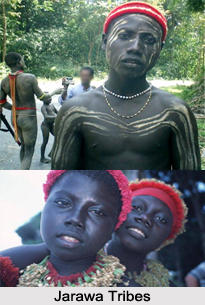 Jarawa Tribe is one of the indigenous peoples of the Andaman and Nicobar Islands in India. The Jarawas are one of the 4 tribes in the Andaman. Jarawas live in the jungles of Middle Andaman on the west side of the Andaman Islands. They are hunters and gatherers and live on the 2 large islands. This is the only tribe which has remained a hunter and gatherer in the true sense as the Jarawas are not dependent on government subsidy of any kind, and hunt in the sea or in the jungle and do not wear city clothes unless they are provided by the government officials for bringing them into Port Blair.
Jarawa Tribe is one of the indigenous peoples of the Andaman and Nicobar Islands in India. The Jarawas are one of the 4 tribes in the Andaman. Jarawas live in the jungles of Middle Andaman on the west side of the Andaman Islands. They are hunters and gatherers and live on the 2 large islands. This is the only tribe which has remained a hunter and gatherer in the true sense as the Jarawas are not dependent on government subsidy of any kind, and hunt in the sea or in the jungle and do not wear city clothes unless they are provided by the government officials for bringing them into Port Blair.
The construction of Andaman Trunk Road (ATR) has pushed Jarawas on one side of the island and constant poaching of their game and honey by the city dwellers often leaves them without basic subsistence. Since they have largely shunned interactions with outsiders, many particulars of their society, culture and traditions are poorly understood.
Origin of Jarawa Tribe
The Jarawas are the First Citizens of their habitat. The name “Jarawa†is given to this tribe by the Great Andamanese which means "strangers". They are the original forest beings. Like other Andamanese tribes, they had inhabited in the islands for at least several thousand years. The Jarawa is regarded as the descendants of Jangil tribe, which are now extinct.
Government Policies for Jarawa Tribe
The Government of India had initially set aside an area for the Jarawa but the size of this reserve gradually reduced as more of their land came under construction for roads and settling migrants from the mainland. They are forcing the Jarawa to go deeper into the forest, into smaller areas. They have survived waves of migrants and colonists but fallen prey to Government policies which looked upon them as "primitive" and in terrible need of "development". The development policy of the Government meant encroaching on their traditional hunting grounds, clearing the forests to settle thousands of migrants, relocating the indigenous people to "settlements", splitting communities that had always lived together and introducing them to an alien way of life, language and religion. Such changes have impacted their physical and mental health of Jarawas.
Moreover the contact with non-indigenous people exposed these groups to diseases to which they had no resistance. An epidemic of measles in 1999 wiped away 10 percent of the Jarawa population. There are only 300-400 Jarawas left now. Alcoholism, obesity, diabetes and depression, are other ailments which are now appearing among those who have been "relocated" to "civilisation".
Related Articles
Indian Tribals
Indian Tribal People
Tribes of Andaman and Nicobar Islands
Andaman and Nicobar Islands
Crafts of Andaman and Nicobar Islands
Beaches of Andaman and Nicobar Islands
Andaman and Nicobar Islands Tourism
Island Tourism Festival
Cellular Jail
















